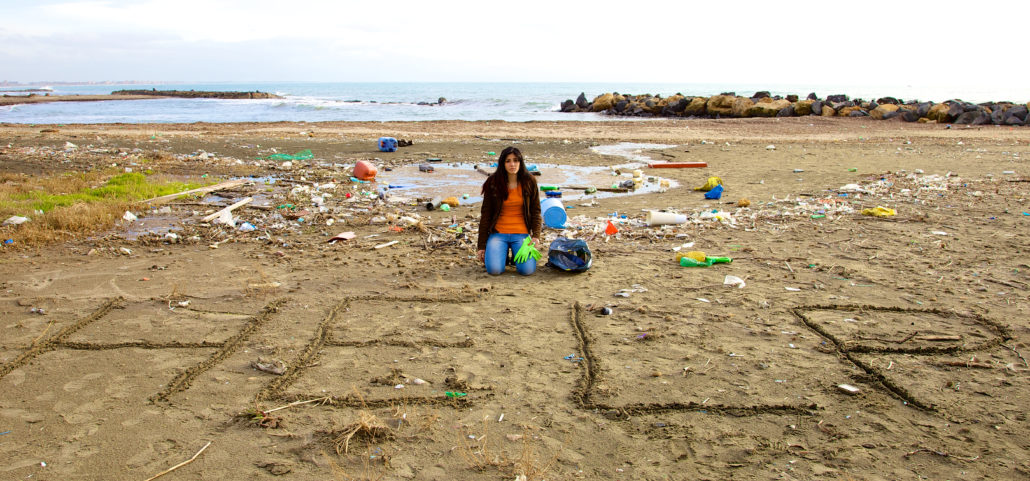Summer is here, a great time to go to the beach to have fun in the sun with the family and friends and the perfect time to remind you the importance of going GREEN on the blue sea.
In my recent participation with Great American Cleanup, Broward Beach Sweeps I was astonished with my findings while cleaning up the beautiful Beach of Fort Lauderdale. Eighty volunteers including myself collected 200 pounds of trash in 1 mile of beach. Accordingly with the data from the 2012 International Coastal Cleanup, 22,086 volunteers collected 428,962 pounds of trash
in 952 miles of shore in the Florida coastal and more than half a million volunteers participated worldwide, collecting more than 10 million pounds of trash covering a distance of nearly 18,000 miles of coastline.

We have a global problem that we have to solve, a message from the ocean that we must listen. People around the globe are concerned and are looking for solutions. The use of disposable plastic in our beach represents a great threat to our shores, poison our oceans and land. We must shift our societies away from disposable habits that harm the environment by eliminating our consumption of throwaway plastics this summer and embracing a culture of sustainability
WHAT IS MARINE DEBRIS?
Marine debris is a major global pollution problem affecting every waterway. It is human created waste that has deliberately or accidentally been release on land, lake, sea, ocean or waterway. Researchers classify debris as either land- or ocean-based, but the 80% of the pollution is land based, the majority of this debris is plastic. This debris range from fast-food packaging; cups, plates, forks, knives, spoons, beverage containers, caps, lids, bags, syringes, condoms, balloons, six-pack rings, tampon applicators, among others.
Other types of debris come from the ocean like lost fishing line and nets, and various wastes from cruise ships.
THE GREAT PACIFIC GARBAGE PATCH: A PAINFUL REALITY
I can’t talk about Marine Debris without referring to the Pacific Garbage Patch. Also described as the Pacific trash vortex, is a gyre of marine debris floating in the central North Pacific Ocean. Studies had estimated that 80% of the garbage comes from land-based sources and 20% from ships. This Garbage Patch contains more than 100 million tons of plastic. The size of the patch is unknown. Estimates of size range from twice the size of Texas, up to twice the size of the continental United States. This is a painful reality that we must correct. The Ocean is screaming for HELP that we can’t ignore.
THE NEGATIVE IMPACT:
The Marine debris is a global threat with a wide range of negative effects like: degrading ocean habitats, endangering marine and coastal wildlife. Ocean pollution affects at least 267 species worldwide, including 86% of sea turtle species, 44% of all sea bird species, and 43% of marine mammal species. Plastic is made from petroleum and toxic chemicals that are often not found on labels, but can be toxic to humans and animals. Marine Debris interferes with navigation impeding commercial and recreational fishing, affecting the aesthetic beauty and enjoyment of the coastal areas, thus negatively affecting tourism and as consequence resulting in economic losses. Also, pose a human health risk, medical wastes and drug ending up on beaches can carry diseases, and broken glass and other sharp objects can be very harmful to unsuspecting beach goers, including young children.
CONCLUSION:
Fighting against ocean pollution start with us this summer, small steps lead to big results. You can stop the waste when going to the beach; remember, what we use for a few minutes could pollute our oceans for hundreds of years. This is a problem we can solve together. Here I share some tips: REDUCE the amount of plastic you buy and the trash you produce, REUSE items instead of single-use products, RECYCLE as much of your trash as you can, proper disposal of Household Hazard Waste, join local efforts to pick up trash and Spread the word.
Enjoy this summer, be part of the solution, not the problem!
For information about waste management, environmentally preferable purchasing (EPP), or how to join local efforts to clean up our beach, please, send me an email to: floridaleedap@gmail.com.
Ciudad Weston Newspaper

